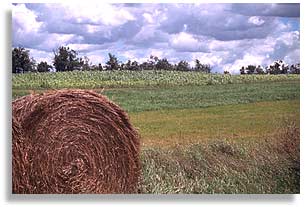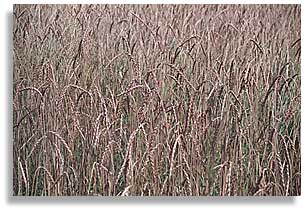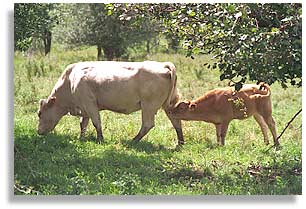|
of Canada's National Farmers Union Part 2 - Sustainable farming Howe Island, Ontario, Canada
Peter Dowling is the Ontario Coordinator for the National Farmers Union (NFU). The interview was conducted by Nic Paget-Clarke on the Dowling farm on Howe Island in the Thousand Islands area of eastern Ontario, Canada, August 16, 2000. In Motion Magazine: What is return on equity? Peter Dowling: That's one of the main measures of business performance. You look at your equity in your farm and how much farm income you have left over to pay the interest on that equity. In Motion Magazine: How does looking at that tell you what is going on with farmer's income? Peter Dowling: You can look at return on equity in relation to what other businesses are doing. About ten years ago in Canada, the federal government put out a paper called "Growing Together" for a discussion about where agriculture should be going in the '90s. The authors looked at the return on investment for manufacturing versus food processing. Manufacturing, in general, had a 15 to 20 percent return on equity, and the food sector had about 14 percent. There seemed to be some concern that corporations involved in food were not getting the same return as the more general return on investment. In the same paper, when they examined farmer's return on investment, they calculated it at about three percent. That number is lower today. It seemed to be acceptable to compare that three percent, not to other food processing or to general manufacturing benchmarks, but to compare the farmer's return on investment to the stock exchange. It was acceptable to compare farm returns to those of a crap game. In Motion Magazine: Can you talk about "Pork Links"? Peter Dowling: Pork Links is a little project that was carried out in Saskatoon, Saskatchewan. Low income families purchased pork directly from hog producers for less than they would have paid at the supermarket pork. The farmers got more than the market was paying at the time and a price that they could meet their payments with. In Motion Magazine: As a farmer, once you've recognized that the problem is not subsidies - what do you do about it? Peter Dowling: We are starting to develop some suggestions for solutions to the problem. One that we put forward in August, is a set-aside program. We are proposing, at the international level, that all the large grain producing countries negotiate an agreement to set aside a percentage of their land in grain and oilseed production, so that the amount of commodity on the market is reduced. With the reduction in supply the price would increase. We are suggesting a systematic withdrawal of land from production until such time as the price of grain doubles. We don't think it would take too long to accomplish that goal given the low grain stocks in the world. There have been set-aside programs in the past but none of them have been on a scale that would effect the world price. At a local level, many of our National Farmers Union members have converted to organic production. Locally, we've had courses on how to produce food with fewer chemicals and fertilizers, what I call reducing or eliminating our chemical dependencies, where we farm with as much of our own resources as we can. When you market your product as organic often premium prices are paid. Those kinds of things help to improve the farm income situation. In Motion Magazine: How are they working on your farm? Peter Dowling: I started more than ten years ago farming without chemicals and fertilizers. I like doing it. It's satisfying working without chemical inputs. For about five years, we have been certifying the farm as organic and since then we've been marketing spelt, which is an ancient grain that is used for organic flour. It pays better as a crop than some of the other flour crops such as wheat. It's hardier and develops well on our farm. As a fall planted crop, it helps to distribute the work load. We are also trying open-pollinated corn to get away from the need to buy new seed every year from a huge seed company which is involved in producing genetically modified organisms. All organic producers are required to avoid GMOs. Genetically modified organisms (GMOs) In Motion Magazine: Does the NFU have a position on genetically modified organisms? Peter Dowling: We have a position on some aspects of the issue. The NFU is working on a more comprehensive policy. Corporate power over our food supplies is one of our big concerns - the technical use agreements. As these products become more and more adapted and the conventional ones disappear, it means that corporations have more and more control over everything that goes into our mouths. If huge seed companies can control what seeds we use then eventually those are the only ones that we have access to. This is our concern. Some producers have already had to go out of certain crops, such as organic canola, because they can't be sure that canola has not been crossed with nearby genetically engineered material. In those cases, the NFU takes the position that those producers must be compensated for loss of their livelihood through interference with their ability to produce organic canola. In Motion Magazine: You mean from companies like Monsanto? Peter Dowling: Yes. In those cases, the companies that put this technology out don't have any control over the pollen, where it goes. It cross-pollinates. When there's a large acreage grown in an area and one person is trying to grow organic and the others aren't concerned about it then it gets to the point where the organic producer just has to quit.
In Motion Magazine: What do you think about NAFTA, as a farmer in one of the three partners (U.S., Mexico and Canada)? Peter Dowling: We had a lot of arguments against NAFTA during the negotiations and we don't think it's really helped much for farmers. In Motion Magazine: How was it supposed to help? Peter Dowling: The level playing field had always been the big emphasis. We don't want the level playing field if it means getting rid of supply management and going to American prices for dairy products. We don't want to have to produce milk for the kind of prices that are being paid in the United States. One of the things in NAFTA, as I recall, was a measure making new supply management systems illegal. But the more corporations merge and network and take over each other, the more we need those structures to balance market power. So that measure is counter-productive. At the same time as corporations are getting together to control business, we are restricting the farmers from getting together to marketing their products. World Trade Organization (WTO) In Motion Magazine: What's going on with the WTO right now? Is that relevant? Peter Dowling: Negotiations are going quite slowly. It's hard to know because there's nothing too public. I think the Battle of Seattle, at least on the outside, seemed to slow things down. But there are all kinds of things going on that we don't hear about. I don't know what stage it's at. I know that the WTO agreement that is in place now has caused some problems for Canadians with rulings on dairy. Exports now have to be handled at-arms-length from the marketing boards. Also, there was a slip up on butter oil blends. They were not included in the tariffs that were agreed on so that the blends are coming into Canada at world prices and undermining our domestic market. We are losing some production to these rulings. In Motion Magazine: Why are Canadian prices higher than the world prices? Peter Dowling: Supply managed commodities have cost-of-production pricing in Canada. For products that are produced, processed and consumed in Canada, milk - poultry and eggs products - the price that the producer gets, reflects the cost of production for the most efficient farmers. In Motion Magazine: What would happen if those prices were reduced? Peter Dowling: If the price drops below the cost of production for efficient Canadian producers, we will see problems similar to family farms in the United States who can’t make a go of it at world prices. In Motion Magazine: Who is profiting from those world prices? Peter Dowling: It's the same as for grain. It doesn't matter to processors what the price is. They just mark it up. They are going to profit from any price. In Motion Magazine: Who is producing product at the cheaper price? Peter Dowling: New Zealand and the United States are exporters of cheap dairy products. In Motion Magazine: They are selling at the lower price? Peter Dowling: Yes. In Motion Magazine: So what is happening to their farmers? Peter Dowling: They are struggling too. Both the New Zealand and American farmers are hurting from the de-regulated marketing of dairy products. In Motion Magazine: What do you think of Lyle Van Clief, the Canadian agricultural minister? Peter Dowling: He's a concern. He's the kind of minister our government wants. The prime minister put him there for a reason. He doesn't come across as an advocate for farmers. He's more protective of government than he is of farmers. He comes across as quite insensitive to the issues, particularly the farm income crisis where farmers are in a desperate financial situation. He doesn't seem to be able to show any sensitivity to that even though he lost many of his own farm assets in the '80s. In Motion Magazine: So the three players are the government, the farmers and the corporations? Peter Dowling: And the consumers. In Motion Magazine: Is the government protecting the government? Or do their policies objectively help the corporations? Peter Dowling: I don't think they help the corporations in an overt way. But, for example, in the issue of grain transportation in western Canada, the government is deregulating the transportation of grain and there are only two rail companies in Canada. It's very close to a monopoly situation. It's taking an unbalanced situation and deregulating it into a worse situation for farmers. There used to be quite a bit of government support for grain transportation. There was a thing called the Crow Benefit. It was a government program - an agreement between the railways and the government - that supported grain transportation. That disappeared in the '80s. Since then the railways have been getting the profits and the cost of transportation is such that farmers can't hold on to a decent living. The government could force these two railways to compete with each other. They could compete for the farmer's business. Rather, we have an almost monopoly situation. In Motion Magazine: Where do you think it's going for small farmers? Peter Dowling: More and more people are interested in alternative ways of producing food, alternatives to the conventional wisdom of the last several decades. People are starting to question some of these practices. Some of these people are showing up in the National Farmers Union and we are working as a group to learn about and develop alternatives. In Motion Magazine: What are the conventional practices? Peter Dowling: The chemical and fertilizer regime, the hybrids, monoculture, the kinds of practices that have an negative effect on the soil. In Motion Magazine: Are those techniques being questioned by small farmers out of a need for survival? Peter Dowling: Certainly survival is the motivator for some. Others are just tired of the pressure of doing it the way the experts say to do it without getting a share of the profits. In Motion Magazine: What kind of experts? Peter Dowling: In Ontario, over the last hundred years, we have had a lot of advice given out by government. This has been followed by universities giving advice on how to produce food. People pick up that stuff and they try it and get locked into it. You've got a certain type of equipment to do things a certain way so you do it that way. You do it until you start to question it.
Peter Dowling: The NFU is involved with groups internationally, such as the National Family Farm Coalition in the United States, through an organization called Via Campesina - peasant way. It's a group of peasant, small and medium-sized family farmers organized internationally. We hear about what is going on in some of these other countries. Many of the people that are questioning these practices are people participating in Via Campesina. In Motion Magazine: Why do you think they are questioning these practices? Peter Dowling: It’s not sustainable economically or environmentally to carry on the way we have. When I first started questioning, I was using a lot of these conventional practices and I wasn't getting the kind of return from my commodities that I needed in order to carry on producing. It was just too expensive. In Motion Magazine: Do you think this questioning movement is getting to the point where it's having an impact? Peter Dowling: Well, it's certainly having an effect on those who are questioning. Consumers are also questioning some of these practices. You see that in the GMO area. They are demanding alternatives and farmers are willing to meet those demands. These alternatives are good for all concerned. Also, these alternatives tend to be more local. Food doesn't get transported as far. The average food we eat has about 1,800 miles on it before it gets to your table which doesn't seem like a good use of fossil fuels. On the other hand, family farmers could go another way. About five years ago, there was a Purdue University professor travelling here in Ontario who had done some math on the disappearance of farms in North America. He had figured out that in 40 years, by 2040, there'd be seven farms left in North America at the present rate of disappearance. None of us as family farmers are safe.
Also see:
|
|||||||||||||||||||||||||||||||||||||||
| Published in In Motion Magazine - November 12, 2000 |
|||||||||||||||||||||||||||||||||||||||
If you have any thoughts on this or would like to contribute to an ongoing discussion in the  What is New? || Affirmative Action || Art Changes || Autonomy: Chiapas - California || Community Images || Education Rights || E-mail, Opinions and Discussion || En español || Essays from Ireland || Global Eyes || Healthcare || Human Rights/Civil Rights || Piri Thomas || Photo of the Week || QA: Interviews || Region || Rural America || Search || Donate || To be notified of new articles || Survey || In Motion Magazine's Store || In Motion Magazine Staff || In Unity Book of Photos || Links Around The World NPC Productions Copyright © 1995-2020 NPC Productions as a compilation. All Rights Reserved. |
|||||||||||||||||||||||||||||||||||||||




